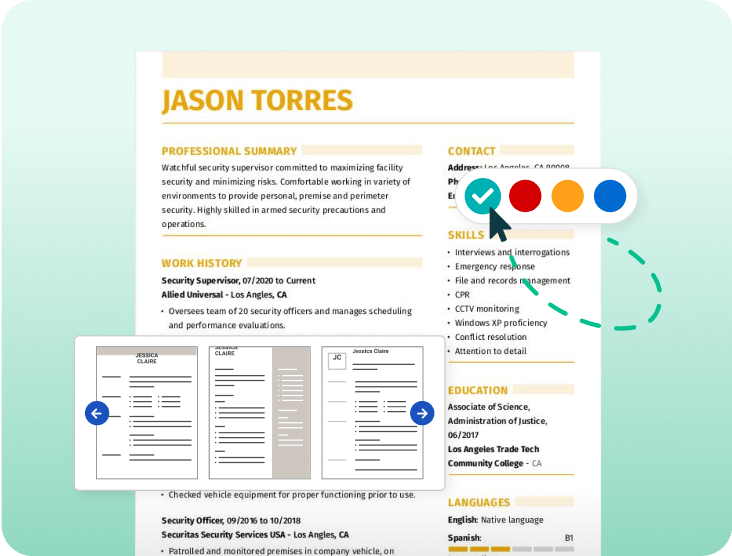- Featured in:
Presenting information clearly and compellingly is a required skill for most professions and one that employers seek in potential employees. In this article, we’ll show you the top presentation skills to add to your resume and how to convince employers your abilities are top-notch.
Whether presenting a proposal, briefing your client on research results or walking your supervisor through project timelines, we give you a comprehensive list of presentation skills with definitions to add to your resume. Follow our expert advice to learn how to effectively feature your presentation skills in your job application.
Want a stronger resume? Try our resume templates. Simply edit and download. Plus, you’ll get ready-made content to add with one click using our Resume Builder.
Or view our sample resumes made with our professional templates.
What Are Presentation Skills?
Presentation skills are holding an audience’s attention while speaking, giving slideshows or using visual demonstrations to convey information. Public speaking and presentation skills are very closely related abilities. Good presentation skills require that you feel confident and comfortable speaking in front of others, including work colleagues, management or potential employers.
These skills are the most critical for specific jobs involving, among others, teaching, public health, training, HR or leadership roles that may require you to be adept at explaining ideas to a group. Of course, there are reasons to give presentations now and then in many arenas, including company-wide training, financial reports and project development.
Someone well-versed in presentation knows how to effectively relay essential data, considerations, thoughts and strategies.
10 Additional Presentation Skills
Basic presentation skills are always helpful to include in any job application. Consider adding these extra skills to your resume:
- Voice projection
- Stage presence
- Self-awareness
- Conciseness
- Grammar
- Multilingual writing
- Cohesion
- Summarization
- Vocabulary
- Transitions
Presentation Skills FAQ
How do you list presentation skills on a resume?
Pay very close attention to the skills and keywords the job post puts the most emphasis on. Highlight your skills based on the demands of this current job. Try to echo back phrases you see in the ad if applicable to your background.
There are two best places to feature presentation skills in your resume. The first is to have a skills section, list six to eight total skills, and ensure they include a balance of hard, soft and technical skills.
The other option is to include them in your work experience and achievements sections. For example, instead of just listing the skill “PowerPoint slideshows,” you could list it as a work experience like this, “Led PowerPoint slideshows for groups exceeding 50+ in all-hands company meetings.” Try to include numbers to make it easier to describe the significance of your presentations.
How to describe presentation skills on a cover letter?
If your ability to give a good presentation is central to the role that you’re applying to, you should tell a story in your cover letter that makes a convincing case for your claim.
Give an anecdote about your presentation skills that shows your mastery. Include it in a problem-action-resolution framework. You first identify an obstacle you had to confront, mention how you put your presentation skills into action, and then explain the outcome.
How do I highlight my presentation skills during an interview?
Much like how you can use your cover letter to tell a story, in your interview, you need to support your claims about possessing presentation skills with convincing details and stories about your experience.
So, if you know that presentation skills, such as a teacher, are central to your job, then be prepared to discuss them!
Why are presentation skills important?
Almost every job field requires presentation skills, whether for persuading clients or speaking to your colleagues. Strong presentation skills demonstrate the candidate is self-confident, a problem-solver, motivated and a compelling communicator. Effectively showcasing these abilities will convince the hiring manager that you are a leader and the right person for the job.
How to improve presentation skills?
There are plenty of ways to improve your presentation skills. Here are a few:
- Practice, practice, practice: Practice your presentation until it becomes second nature. This will help you stay quick on your feet and easily answer follow-up questions.
- Be passionate: Show your enthusiasm on the subject. The audience is likelier to engage with a presentation if the presenter is excited about sharing it.
- Become a storyteller: Being able to tell a story relevant to the information will make it more palpable and dynamic for the audience.
- Know your audience: Tailoring your message to your audience will ensure it resonates.
- Own your nerves: If you're nervous, being open about it will show you are authentic and relieve some of the tension.
- Use humor: Knowing when to insert a joke or funny comment is a skill that will help you gain attention if you lose it.
- Visual aids with intention: Be mindful of the visual aids you use. Make sure they complement the information.
- Focus on the bottom line: While making jokes and sharing stories can help with engagement, staying on topic is essential.
- Arrive extra early: Feeling out of the room and getting yourself in the right headspace will help your presentation run smoothly.
- Mingle beforehand: Small talk with the audience members will help you remember that they are people like you!
If you want courses on presentation skills, you have plenty of options, like self-help articles, books, videos and conferences that offer suggestions on being more effective, persuasive or informative when presenting.





